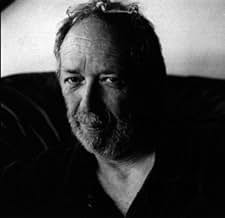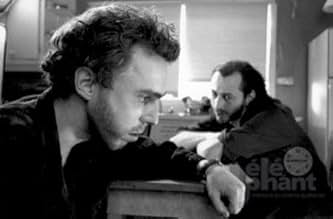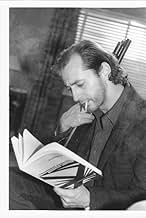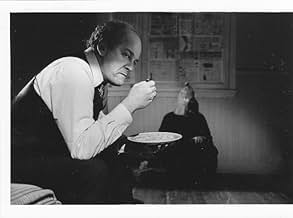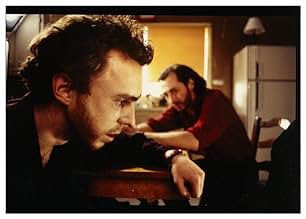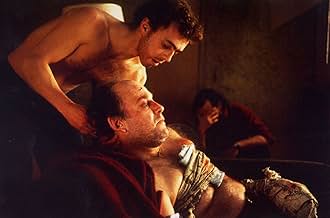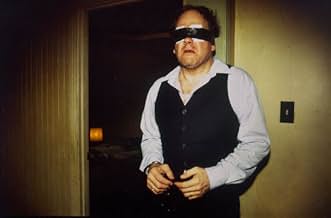A dramatization of the infamous Canadian terrorist abduction & murder of a government minister by a cell of The Quebec Liberation Front.A dramatization of the infamous Canadian terrorist abduction & murder of a government minister by a cell of The Quebec Liberation Front.A dramatization of the infamous Canadian terrorist abduction & murder of a government minister by a cell of The Quebec Liberation Front.
Hugolin Chevrette-Landesque
- Neveu
- (as Hugo C. Landesque)
- Director
- Writers
- All cast & crew
- Production, box office & more at IMDbPro
Featured reviews
As a movie, Octobre is not very interesting, except maybe for Quebeckers that might want to renew with a part of their past, in a fictionalized way.
As a documentary, Octobre is totally wrong, showing us just one biased side of the story, failing to describe the reality.
The felquists are well played by the lead actors but the story is not very inspiring. After kidnaping the minister of Labor, Pierre Laporte, they wait for the government to negotiate with them. They want the independence of Québec.
Falardeau, himself in favor of independence from Canada, presents the felquists as heros, good guys that needed to do what they've done, for the «cause». While in fact, these guys are just fanatics that read a little too much books about the Revolution. They had the arrogance to think that they were talking for everybody else, that Quebeckers were a 100% behind them.
So it goes on! They kidnaped the minister but they treat him like a friend. Maybe a little bit more water, monsieur le ministre! We're sorry we have to do that! They even give a good tip to the delivery guy! I think it's a manipulative way for Falardeau to present the felquists as martyrs of the independence. And one of the felquists to say: «If we didn't had heart, we wouldn't be here today»...
As all terrorists, the felquists in this movie had an utopian idea of the country where they wanted to live. They were sure about one thing: they were right. And Falardeau, by making this movie, wants us to have sympathy for those guys. Well, sorry Mr Falardeau, but I think your movie may appeals to some independists from Québec, but no more. Cause, once again, as a movie, it's not that good, and as a documentary, it's just propaganda.
Because of the acting, I gave this movie 73 out of 100. That's good for **½ on a **** stars rating system.
Seen at home in Welland, on January 29th, 2002.
As a documentary, Octobre is totally wrong, showing us just one biased side of the story, failing to describe the reality.
The felquists are well played by the lead actors but the story is not very inspiring. After kidnaping the minister of Labor, Pierre Laporte, they wait for the government to negotiate with them. They want the independence of Québec.
Falardeau, himself in favor of independence from Canada, presents the felquists as heros, good guys that needed to do what they've done, for the «cause». While in fact, these guys are just fanatics that read a little too much books about the Revolution. They had the arrogance to think that they were talking for everybody else, that Quebeckers were a 100% behind them.
So it goes on! They kidnaped the minister but they treat him like a friend. Maybe a little bit more water, monsieur le ministre! We're sorry we have to do that! They even give a good tip to the delivery guy! I think it's a manipulative way for Falardeau to present the felquists as martyrs of the independence. And one of the felquists to say: «If we didn't had heart, we wouldn't be here today»...
As all terrorists, the felquists in this movie had an utopian idea of the country where they wanted to live. They were sure about one thing: they were right. And Falardeau, by making this movie, wants us to have sympathy for those guys. Well, sorry Mr Falardeau, but I think your movie may appeals to some independists from Québec, but no more. Cause, once again, as a movie, it's not that good, and as a documentary, it's just propaganda.
Because of the acting, I gave this movie 73 out of 100. That's good for **½ on a **** stars rating system.
Seen at home in Welland, on January 29th, 2002.
In regards to previous comments, a few things need to be said. First, this movie is not a documentary and it doesn't have the pretension to be one. So I think you need to keep this in mind, and not expect to hear experts come to the camera and give «neutral» and «objective» clarification.
Second, the movie is based on a book written by one of the felquiste. So it would be incorrect to jump to the other extreme and say that the story is «fictionalized». The book, as well as the movie, is written in plain honesty, many years after the events that took place in 1970.
Keeping in mind that the movie depicts the events as seen through the eyes of one of the perpertrators, the movie is extremely effective in showing how Ideals can grasp people, how revolutions (often failed) occur, what it means to believe in something with all your heart. It also shows, and you must be blind not to see this, how events like these might as well take a proportion that was not intended, and that playing with the lives of individuals is not as easy as it might seem in the first place.
Octobre shows the real meaning of politics, of a political event, of a revolution. It shows that political events are never totally black or white.
You might say that because Falardeau is a separatist he doesn't give a neutral or objective point of view, and thus, the movie is biased. I'll be ready to accept this critique when somebody shows me a way to depict such an event in a neutral and objective way. A lot of people won't be able to appreciate Octobre for two possible reasons : a) they lack the necessary background to understand the story, or b) they view the movie as another absurd propaganda from separatists.
Other than that, Falardeau renders very well the tension that builds inside the small house where five people are stuck, waiting for the government to negotiate. It is a very emotional movie ; I saw the movie in Montréal when it came out. There weren't many people in the movie theatre. When the movie ended, I stood up to leave and noticed two older people, a man and a woman. Both we're still looking at the blank screen, silent. I thought that they were probably involved in the FLQ, that they were probably arrested also. Watching this movie must have been very difficult for them, at least this is what their eyes told me.
Second, the movie is based on a book written by one of the felquiste. So it would be incorrect to jump to the other extreme and say that the story is «fictionalized». The book, as well as the movie, is written in plain honesty, many years after the events that took place in 1970.
Keeping in mind that the movie depicts the events as seen through the eyes of one of the perpertrators, the movie is extremely effective in showing how Ideals can grasp people, how revolutions (often failed) occur, what it means to believe in something with all your heart. It also shows, and you must be blind not to see this, how events like these might as well take a proportion that was not intended, and that playing with the lives of individuals is not as easy as it might seem in the first place.
Octobre shows the real meaning of politics, of a political event, of a revolution. It shows that political events are never totally black or white.
You might say that because Falardeau is a separatist he doesn't give a neutral or objective point of view, and thus, the movie is biased. I'll be ready to accept this critique when somebody shows me a way to depict such an event in a neutral and objective way. A lot of people won't be able to appreciate Octobre for two possible reasons : a) they lack the necessary background to understand the story, or b) they view the movie as another absurd propaganda from separatists.
Other than that, Falardeau renders very well the tension that builds inside the small house where five people are stuck, waiting for the government to negotiate. It is a very emotional movie ; I saw the movie in Montréal when it came out. There weren't many people in the movie theatre. When the movie ended, I stood up to leave and noticed two older people, a man and a woman. Both we're still looking at the blank screen, silent. I thought that they were probably involved in the FLQ, that they were probably arrested also. Watching this movie must have been very difficult for them, at least this is what their eyes told me.
Octobre - I have vivid memories of this sad time. I hoped this would be a film with a message for history. I didn't see it.
The idea that characters in this film tried to break out of their role in some human fashion is a mystery to me. The results of real-life October 1970 was not as complex as this film claims: The FLQ kidnapped and murdered a politician. That is not human - it is inhuman.
Another idea in this film is that the terrorists were simply working class people who got fed up with oppression and tried to wake up a nation. Once again the truth I remember in 1970 wasn't that complex. By kidnapping and murdering they became the oppressors they hated. Kafka was right - the rebel who kills the oppressor eventually becomes the oppressor.
Saddest of all for me is the film's implicit message that the FLQ terrorists were somehow faced with a dichotomy: to remain oppressed or to kill their kidnap victim for recognition.
How different is that from Islamic terrorists flying planes into buildings and others who think that they too are oppressed and unrecognized? I hope someone will someday make another film about this sad chapter in Quebec/Canadian history. And I hope that film will portray a vivid lesson that I learned living through that awful time: Murder and violence is an affront to humanity and will never build a civil or livable country! THAT is the only lasting message I remember from the October Crisis.
The idea that characters in this film tried to break out of their role in some human fashion is a mystery to me. The results of real-life October 1970 was not as complex as this film claims: The FLQ kidnapped and murdered a politician. That is not human - it is inhuman.
Another idea in this film is that the terrorists were simply working class people who got fed up with oppression and tried to wake up a nation. Once again the truth I remember in 1970 wasn't that complex. By kidnapping and murdering they became the oppressors they hated. Kafka was right - the rebel who kills the oppressor eventually becomes the oppressor.
Saddest of all for me is the film's implicit message that the FLQ terrorists were somehow faced with a dichotomy: to remain oppressed or to kill their kidnap victim for recognition.
How different is that from Islamic terrorists flying planes into buildings and others who think that they too are oppressed and unrecognized? I hope someone will someday make another film about this sad chapter in Quebec/Canadian history. And I hope that film will portray a vivid lesson that I learned living through that awful time: Murder and violence is an affront to humanity and will never build a civil or livable country! THAT is the only lasting message I remember from the October Crisis.
If I had to use only one word to describe this movie, I'd say "strong". This movie is intense, thought-provoking and at the same time it is very smart.
I think it's pathetic that people said it was either white or black just because it was one of Falardeau's work (and that he's doing "propaganda" for the separatists). That is like saying soveregnists are too dumb to understand what they are fighting for, but the true stupid ones are those who didn't see the shades of grey in this movie. This film was not intended to show "bad guys" and "good guys", it was a movie about five men living hell in a small house for an entire week. Quebecers know their story, so the movie does not tell all the events that happened in Quebec during that time, it tells about something nobody is sure about, because what happened in this little house is only known by the five guys that were there. The movie is based on a book written by one of the guy, 12 years later, but Falardeau also read -many- documents about the events to be sure he was sticking to the facts when it came to the political/historical elements [read his book "La liberté n'est pas une marque de yogourt", for more info].
The "felquistes" have a heart in this movie, but some people think this is just to make us believe they were the "good guys". I believe thinking that is idiotic, because if the felquistes are shown as being nice, it doesn't mean the movie says they did not make a mistake. And a big one. See, that's what I meant about the shades of grey. Also, for younger Quebecers or people outside Quebec, a whole dimension of the movie --and of the felquist act-- is not understood, and that is when they [the felquists] say that they worked for English bosses that did anything they wanted to them. People tend to think the guy that says that in the movie is only talking about HIS situation, but he's talking about the general situation of Quebecers at that time: slaves to the English, "inferior" people that could not be given respectable roles in companies.
The dialogues are very interesting and the actors deliver an incredible performance. The silences toward the end of the film are heavy and highly dramatic... A true must-see for people interested in this part of Quebec's history, but you must know the political/historical/social setting to understand.
I think it's pathetic that people said it was either white or black just because it was one of Falardeau's work (and that he's doing "propaganda" for the separatists). That is like saying soveregnists are too dumb to understand what they are fighting for, but the true stupid ones are those who didn't see the shades of grey in this movie. This film was not intended to show "bad guys" and "good guys", it was a movie about five men living hell in a small house for an entire week. Quebecers know their story, so the movie does not tell all the events that happened in Quebec during that time, it tells about something nobody is sure about, because what happened in this little house is only known by the five guys that were there. The movie is based on a book written by one of the guy, 12 years later, but Falardeau also read -many- documents about the events to be sure he was sticking to the facts when it came to the political/historical elements [read his book "La liberté n'est pas une marque de yogourt", for more info].
The "felquistes" have a heart in this movie, but some people think this is just to make us believe they were the "good guys". I believe thinking that is idiotic, because if the felquistes are shown as being nice, it doesn't mean the movie says they did not make a mistake. And a big one. See, that's what I meant about the shades of grey. Also, for younger Quebecers or people outside Quebec, a whole dimension of the movie --and of the felquist act-- is not understood, and that is when they [the felquists] say that they worked for English bosses that did anything they wanted to them. People tend to think the guy that says that in the movie is only talking about HIS situation, but he's talking about the general situation of Quebecers at that time: slaves to the English, "inferior" people that could not be given respectable roles in companies.
The dialogues are very interesting and the actors deliver an incredible performance. The silences toward the end of the film are heavy and highly dramatic... A true must-see for people interested in this part of Quebec's history, but you must know the political/historical/social setting to understand.
I have seen this movie twice and both times with English subtitles, but it still doesn't take away from a film that is both powerful and tragic at the same time. It's powerful in that it shows that revolutions and other such acts are carried out by ordinary people placed in extraordinary circumstances. It's tragic because all of the characters attempt to break out their assigned roles and see one another as human and in the end they can't and play them out to the end. The FLQers and their victim are not able to transcend their society and its dictates and so therefore, what happened happened. The only problem I have with this film is the element of inevitability to it, in which in the opening minutes one already knows that it is not bound to begin or end well. That being said, it is worth anyone's time to watch, to study and to understand the tragedy that was the October Crisis in both Quebec and Canada
Did you know
- TriviaPierre Falardeau: The homeless man up the stairs in the second subway station scene.
- ConnectionsEdited into Black October (2000)
Details
- Release date
- Country of origin
- Official site
- Languages
- Also known as
- Outubro Violento
- Filming locations
- Production companies
- See more company credits at IMDbPro
Box office
- Gross US & Canada
- $349,633
Contribute to this page
Suggest an edit or add missing content


